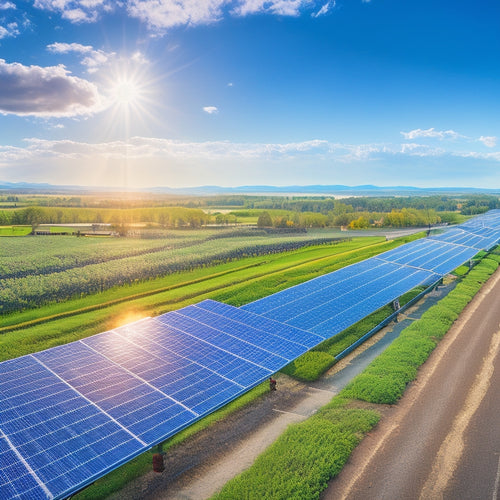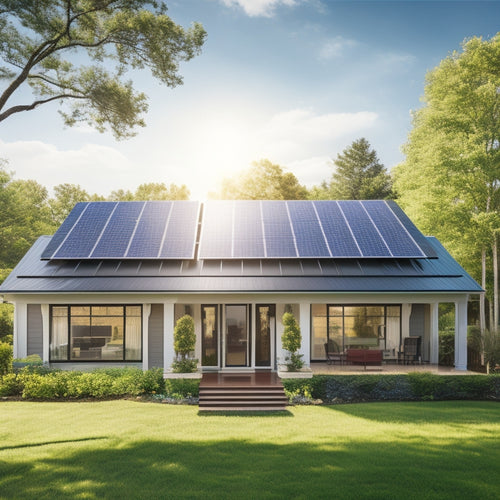
Solar Energy Batteries for Homes
Share
By incorporating solar energy batteries into your home's power system, you can greatly reduce your reliance on the grid, leading to substantial cost savings and increased energy independence. With the potential to cut energy bills by $500-$1,000 annually, these batteries are a smart investment. By breaking free from grid reliance, you'll enjoy backup power during outages, prolonged self-sufficiency, and greater control over energy usage. As you investigate solar energy batteries for your home, you'll want to understand the importance of deep cycle battery design, monitoring depth of discharge, and maintenance to optimize cycle life - and there's more to uncover about revealing their full potential.
The Essentials
- Solar energy batteries reduce reliance on the grid, providing control over energy bills and protection from outages, with cost savings of $500-$1,000 annually.
- Energy independence is achieved by integrating solar panels with storage systems, ensuring sustainable power during outages and peak hours.
- Deep cycle battery design is crucial for maximizing system efficiency, with high-quality models providing several hundred charge/discharge cycles.
- Regular maintenance, including monitoring state of charge and depth of discharge, is essential for enhancing battery performance and lifespan.
- Solar energy batteries for homes typically guarantee longer lifespans, ranging from 10 to 15 years, with modern batteries lasting 25 years or more.
Cut Energy Bills Dramatically
You can greatly lower your expenses by leveraging solar energy batteries to reduce your reliance on the grid.
With a battery storage system, you'll have more control over your energy bills and gain protection from grid outages and fluctuations.
By storing excess energy generated during the day for use at night, you'll minimize the amount of electricity you need to purchase from your utility company.
As a result, you'll see a substantial decrease in your energy bills, which will directly impact your bottom line.
Lower Your Expenses
One of the most significant advantages of solar energy batteries for homes is their ability to dramatically cut energy bills. By utilizing the power of the sun and storing it for later use, you can reduce your reliance on the grid and lower your expenses. This translates to significant cost savings over time, making solar energy batteries a smart investment for homeowners.
| Energy Efficiency | Cost Savings |
|---|---|
| 20-30% reduction in energy consumption | $500-$1,000 per year |
| Peak hour energy shifting | 30-50% reduction in peak hour energy costs |
| Energy storage during outages | Zero energy costs during outages |
With solar energy batteries, you can optimize your energy usage and reduce your energy bills. By storing excess energy generated during the day for use at night or during power outages, you can minimize your energy expenses and enjoy greater energy independence. By investing in solar energy batteries, you can reap the benefits of energy efficiency and cost savings, giving you the freedom to allocate your resources as you see fit.
Reduce Energy Dependence
Solar energy batteries enable homeowners to break free from the grid's shackles, slashing their reliance on traditional energy sources and dramatically cutting energy bills.
By integrating solar panels with advanced energy storage systems, you can utilize renewable resources and store excess energy for later use. This means you'll be less dependent on the grid, reducing your energy expenses and environmental impact.
With the help of residential solar power systems, you can optimize your energy usage and reduce your carbon footprint. Additionally, home renewable energy systems provide a cleaner and more sustainable alternative to traditional energy sources.
With a home installation, you'll enjoy backup power during outages and optimized energy efficiency. Smart home systems can be integrated to monitor and control your energy usage, ensuring maximum savings.
The latest battery technology allows for seamless solar integration, storing excess energy generated during the day for nighttime use. This not only reduces your reliance on the grid but also supports grid modernization efforts.
Increased Grid Independence Days
With a solar energy battery system, you'll reduce your reliance on the grid and extend your power autonomy days.
By storing excess energy generated during the day, you'll have a reserve of electricity to draw from when the sun isn't shining or during grid outages.
With affordable options like the Tesla Powerwall, you can enjoy increased energy savings and backup power.
This means you'll experience fewer interruptions to your daily routine, giving you greater control over your energy usage.
Reduced Reliance on Grid
Utilizing solar energy allows you to break free from the grid's constraints, giving you more control over your electricity usage.
With a solar energy battery system, you'll reduce your reliance on the grid, enjoying increased energy independence and significant solar savings. By storing excess energy generated during the day, you can power your home at night or during periods of low sunlight, minimizing your grid dependence.
This reduced reliance on the grid translates to lower electricity bills and a decreased carbon footprint.
Energy storage systems, like lithium-ion batteries, are designed to optimize your solar energy output, ensuring you get the most out of your investment. By capturing the power of the sun and storing it for later use, you'll be less dependent on the grid's fluctuating energy prices and more in control of your energy usage.
With reduced reliance on the grid, you'll enjoy a sense of freedom and autonomy, knowing you're generating your own clean energy and storing it for when you need it most.
Extended Power Autonomy Days
Generous energy reserves built up during the day enable you to extend your power autonomy, allowing you to ride out prolonged periods of low sunlight or grid outages.
With advanced energy storage systems, you can bank excess energy generated by your solar panels during the day and draw on it when needed. This means you can enjoy extended periods of self-sufficiency, even when the grid is down or sunlight is scarce.
Your home's resilience is markedly enhanced with energy storage capabilities. You can confidently weather storms, heatwaves, or other events that might disrupt the grid.
By decoupling from the grid, you're no longer at the mercy of utility companies or vulnerable to power outages. Instead, you're in control, with a reliable source of clean energy at your fingertips.
With extended power autonomy days, you can rest easy knowing your home is powered, even when the outside world isn't.
Deep Cycle Battery Design
You'll find that deep cycle battery design is critical to the overall performance of your solar energy system, and it starts with the choice of battery construction materials, which can greatly impact the battery's lifespan.
The type of materials used will influence the battery's ability to withstand repeated charge and discharge cycles, a factor that directly affects its overall cycle life expectancy.
When selecting a deep cycle battery, it's important to evaluate the solar power system requirements and the battery's compatibility with your existing solar panel and inverter setup.
This guarantees that your solar energy system operates at maximum efficiency and minimizes your reliance on the grid.
Battery Construction Materials
Ideal performance in deep cycle battery design relies on the careful selection of construction materials, as these components directly impact the battery's ability to store and release energy efficiently.
You'll want to take into account the type of battery you're using, as different battery types require specific materials. For example, lead-acid batteries use a lead dioxide cathode, a sulfuric acid electrolyte, and a lead anode. On the other hand, lithium-ion batteries use a lithium cobalt oxide cathode, a lithium salt electrolyte, and a graphite anode.
The electrolyte composition is also critical, as it affects the battery's overall performance and lifespan. The electrolyte's function is to facilitate the flow of ions between the cathode and anode, enabling the battery to charge and discharge efficiently.
In deep cycle batteries, the electrolyte composition is often refined to reduce internal resistance and increase the battery's ability to handle deep discharges. By selecting the right construction materials and electrolyte composition, you can guarantee your deep cycle battery performs at its best, providing you with the freedom to store and use renewable energy as needed.
Cycle Life Expectancy
Cycle Life Expectancy
Several hundred charge/discharge cycles can be expected from a well-designed deep cycle battery, with some high-quality models providing upwards of 5,000 cycles or more.
When you invest in a solar energy battery for your home, you're not just buying a product - you're investing in a system that requires careful maintenance to enhance its performance. You'll want to guarantee you're getting the most out of your battery's cycle life expectancy.
Proper battery maintenance is vital to achieving peak performance. You'll need to regularly check your battery's state of charge, confirm it's properly ventilated, and keep it free from corrosion.
By doing so, you'll be able to maximize your battery's lifespan and reduce the likelihood of premature failure. Additionally, performance optimization techniques like equalization charging can help to extend your battery's cycle life.
Check Battery Depth of Discharge
You'll need to regularly check your solar energy battery's capacity to guarantee it's operating within a healthy range, especially when using systems like Tesla Powerwall or LG Chem RESU for efficient home energy storage solutions.
This is essential in maximizing solar energy and preventing power outages. This involves monitoring the depth of discharge (DOD), which is the percentage of the battery's capacity that's been used.
Battery Capacity Check
A battery management system (BMS) plays a significant role in monitoring the state of charge (SOC) of your solar energy batteries for homes. The BMS guarantees you're aware of the battery's capacity, which is vital for optimal energy storage.
You'll want to check the battery capacity regularly to confirm it's functioning within the recommended range. Different battery types have varying capacity ratings, so it's important to understand your specific battery's limitations.
For instance, lithium-ion batteries typically have a higher capacity than lead-acid batteries. When checking the capacity, you'll want to take into account the depth of discharge (DOD), which affects the battery's overall lifespan. A deeper DOD means the battery is discharged more frequently, which can reduce its lifespan.
To check the capacity, you'll need to monitor the battery's voltage, temperature, and state of charge. You can use a battery monitoring system or a multimeter to measure these parameters.
Depth of Discharge Limit
As your solar energy batteries for homes operate, the depth of discharge (DOD) plays a vital role in determining their overall health and lifespan. The DOD refers to the percentage of a battery's capacity that's used before it's recharged. If you consistently discharge your batteries too deeply, their lifespan will shorten, and their overall performance will suffer.
To get the most out of your solar energy batteries, it's important to set a reasonable DOD limit. A higher DOD limit means you'll use more of your battery's capacity, but it also increases the risk of reducing its lifespan. A lower DOD limit, on the other hand, will help prolong your battery's life, but you'll have less usable energy.
Aim for a DOD limit between 30% and 50% to strike a balance between discharge efficiency and battery lifespan.
Effective battery management is vital to maintaining your solar energy batteries' health. By monitoring your DOD and adjusting your charging and discharging habits accordingly, you'll be able to enjoy a reliable and efficient energy storage system that provides you with the freedom and independence you desire.
Longer Lifespan Guaranteed
You'll want to contemplate solar energy batteries that guarantee a longer lifespan, as they're designed to withstand the demands of daily charging and discharging.
These batteries typically feature advanced materials and construction that minimize degradation, ensuring you get the most out of your investment.
With an extended battery life, you can expect a minimum of 10 to 15 years of reliable performance, depending on the manufacturer's warranty.
Extended Battery Life
Twenty-five years or more is the typical lifespan guarantee of modern solar energy batteries designed for homes, thanks to advancements in technology and manufacturing. You can rest assured that your investment in solar energy storage solutions will last for decades to come.
To maximize the extended battery life, you'll want to follow some vital battery maintenance tips. Proper installation, regular monitoring, and timely software updates are essential to ensuring your battery operates within ideal parameters. Additionally, you should avoid deep discharging, as this can reduce the overall lifespan of your battery.
Here's a breakdown of the benefits of extended battery life:
| Advantage | Description |
|---|---|
| Reduced Replacement Costs | With a longer lifespan, you'll replace your battery less frequently, saving you money in the long run. |
| Increased Energy Savings | A longer-lasting battery means you'll store more energy and reduce your reliance on the grid. |
| Enhanced Grid Independence | With a reliable energy storage solution, you'll have the freedom to power your home when you need it most. |
| Improved Environmental Impact | By reducing waste and the need for frequent replacements, you'll minimize your carbon footprint. |
Frequently Asked Questions
Can Solar Energy Batteries Be Installed Outdoors or in a Garage?
You can install solar energy batteries outdoors, but guarantee proper weatherproofing and temperature regulation. Alternatively, you can place them in a garage, which provides better protection and easier maintenance, giving you more freedom to monitor and control your energy storage.
Are Solar Energy Batteries Compatible With All Solar Panel Systems?
As you investigate battery options, you'll find not all batteries play nicely with every solar panel system. You'll need to guarantee compatibility between your battery and specific solar panel types, such as monocrystalline or polycrystalline, to optimize energy harvesting and storage.
Do Solar Energy Batteries Require Regular Maintenance to Function?
You'll find that most batteries require periodic checks to guarantee peak performance, extending their battery lifespan. Follow maintenance tips like monitoring temperature, keeping them clean, and updating software to confirm your investment lasts, giving you the freedom you desire.
Can I Use Solar Energy Batteries for My Electric Vehicle Charging?
Like a pit crew refueling a racecar, you'll want to optimize your electric vehicle charging with solar energy batteries, ensuring high charging efficiency by selecting a battery with sufficient capacity to meet your vehicle's power needs.
Are Solar Energy Batteries Covered Under a Warranty or Guarantee?
You should expect an extensive warranty covering your battery's lifespan, typically 10-15 years, with manufacturers like Tesla and LG offering 10-year warranties, while others provide 5-10 year guarantees, ensuring your investment is protected.
Final Thoughts
You're no longer shackled to the grid, with solar energy batteries for homes cutting your energy bills dramatically. Instead, you're enjoying increased grid independence days, thanks to the deep cycle battery design that stores excess energy for later use. But don't forget to check the battery depth of discharge to guarantee peak performance. And with a longer lifespan guaranteed, you can rest easy your investment will pay off for years to come, freeing you from the burden of rising energy costs.
Related Posts
-

What Do I Need to Know About Farm Solar Panels
When considering farm solar panels, you need to assess costs, benefits, and technical specifics. Initial investment c...
-

Applications of Photovoltaic Systems
Photovoltaic systems are versatile, converting sunlight into electricity for various applications. You can use them i...
-

Home Solar Installation Cost
You're considering installing solar panels on your home, and the upfront cost is likely the biggest hurdle standing i...


